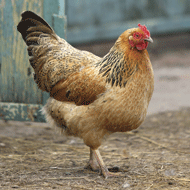UK avian flu case confirmed

Defra has confirmed a case of avian flu at a farm in Lancashire.
A 10 kilometre surveillance zone has been put in place around a farm in Lancashire following confirmation of a case of H7N7 avian flu.
A temporary control zone was imposed on Friday at the affected farm, which has now been replaced with the surveillance zone and an inner three kilometre protection zone. Restrictions remain in place and the humane killing of all birds at the farm continues.
The restrictions mean that all poultry farms within the surveillance zone are not allowed to move poultry, captive birds or other mammals except under licence.
Chief veterinary officer Nigel Gibbens said: "Final tests results have confirmed a case of avian flu at a farm in Lancashire. Restrictions put in place last week will continue and the humane culling of all birds at the site is progressing. These actions are part of our tried and tested approach to dealing with previous outbreaks.
"Public Health England has confirmed that the risk to public health from this strain is very low. The Food Standards Agency has said there is no food safety risk for consumers.
"Bird keepers should remain alert for any signs of disease, report suspect disease to their nearest APHA office immediately and ensure they are maintaining good biosecurity on their premises."
Defra has a strong track record of controlling and eliminating previous outbreaks of avian flu in the UK. Indeed, outbreaks in Yorkshire last year and Hampshire in February were both successfully contained, allowing restrictions to be lifted at the earliest opportunity.



 RCVS Knowledge has welcomed Professor Peter Cockcroft as editor-in-chief for Veterinary Evidence.
RCVS Knowledge has welcomed Professor Peter Cockcroft as editor-in-chief for Veterinary Evidence.